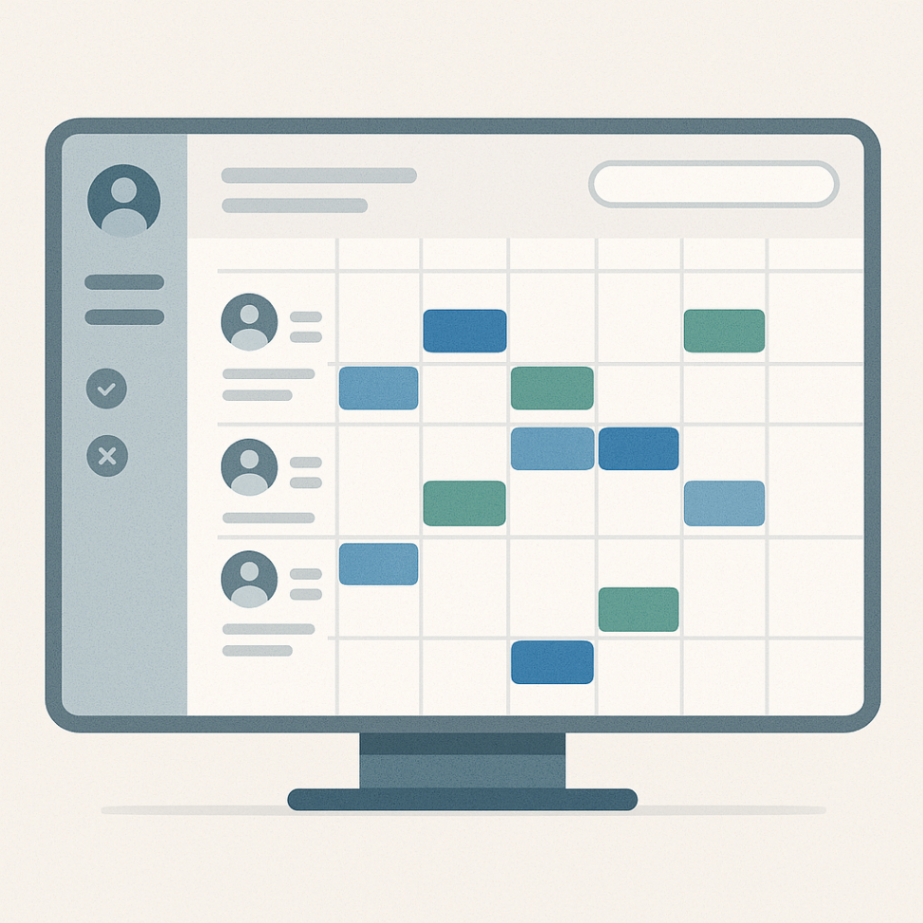We test and review software products using an independent, multipoint methodology. If you purchase something through our links, we may earn a commission. Read about our editorial process.
Running a small business can be hard. One of the biggest challenges owners face is employee scheduling. Whether it’s a retail shop, a startup, or a service business, managers need to set up shift schedules, check employee availability, assign the right people, and watch over employee hours to control labor costs. Doing all this manual work takes time, and mistakes can cause problems like late arrivals, unbalanced schedules, or even labor law violations.

That’s why many small business owners now turn to an employee scheduling app. These tools simplify the scheduling process with features like schedule templates, time clock systems, attendance tracking, and automatic notifications for schedule changes. They also connect with payroll software and HR tools to make payroll processing easier. Employees can use mobile apps to view schedules in real time, request shift swaps, or trade shifts. Some even sync with Google Calendar, reducing confusion.
The best part? These apps often include free plans or a free version, making them affordable even for small businesses. Advanced platforms also offer advanced features in their advanced plans, such as detailed reporting, team communication tools, and integrations with task management and payroll systems.
In this guide, we’ll look at the best employee scheduling software for small businesses in 2026: Netchex, Reclaim, Buddy Punch, Deputy, and Shiftbase.
When selecting the top scheduling tools, we focused on:
Netchex is more than just shift scheduling—it’s a complete HR tool with payroll software integration. Managers can create employee schedules, track employee time, and process payroll without errors. Its intuitive user interface makes it simple for businesses moving away from manual work.
Because all employee hours sync directly with payroll, Netchex helps control labor costs. While it may cost more than a basic employee scheduling app, the all-in-one solution saves time by removing the need for multiple platforms.
Reclaim is designed for flexible teams. Instead of classic shift scheduling, it uses automation to block employee time on calendars. By syncing with Google Calendar, it prevents double-booking and ensures team members get more done.
Although it doesn’t manage shift swaps or late arrivals, Reclaim is great for remote and hybrid businesses that value real time calendar management over fixed schedules.
Buddy Punch is popular for its drop interface that makes creating shift schedules easy. Employees can clock in and out with a time clock feature, track attendance, and even use GPS or facial recognition. The mobile app allows workers to request shift swapping or claim open shifts.
Managers like the balance of simplicity and advanced features, including overtime rules and automatic notifications. Pricing depends on the number of users, making it scalable for both small and large businesses.
Deputy is a strong option for industries with strict labor laws such as healthcare, retail, or hospitality. Employees can trade shifts, update their employee preferences, and get notified of schedule changes through push notifications.
Deputy also integrates with payroll systems, point-of-sale software, and attendance tracking tools. Its team communication features help managers assign tasks and handle business operations more smoothly.
For small businesses planning to scale, Deputy’s advanced plans are ideal.
Shiftbase specializes in flexible, rotating shift schedules, making it useful for businesses with international teams. It provides schedule templates, employee availability tracking, and built-in compliance with local labor laws.
The clean, intuitive user interface works across web and mobile apps, ensuring both managers and employees stay updated with automatic notifications. Shiftbase is also affordable compared to competitors, while still offering solid customer support.

The best employee scheduling app for your business depends on your industry and team size.
Think about the scheduling process, employee preferences, and whether you need advanced features or just a free version.
Employee scheduling software in 2026 gives small businesses the ability to replace manual work with smart, automated systems. These tools improve team communication, reduce errors, and help control labor costs while keeping employees happy with shift swaps, open shifts, and clear employee schedules.
Whether you choose the all-in-one power of Netchex, the smart automation of Reclaim, the simple design of Buddy Punch, the compliance focus of Deputy, or the flexibility of Shiftbase, each offers the advanced features small businesses need.
With the right tool, you’ll streamline business operations, cut costs, and keep your team members satisfied—making 2026 the year your scheduling process finally works for both you and your employees.
Help team members use easy software, get good training, and have frequent talks.
Encourage users to try the software by showing the benefits like easy shift swaps, quick notifications, and simple time-off requests.
A lot of companies provide helpful technical support.
You can begin by checking the software's help documents or FAQs for quick answers.
If the problem keeps happening, you should contact their customer service or help desk.
They can give you personal help and solve the issue fast.
Many scheduling tools work nicely with other HR tools. This allows for easy data transfer. It helps with payroll, timesheet management, and task management. In general, it improves how we handle our workforce.